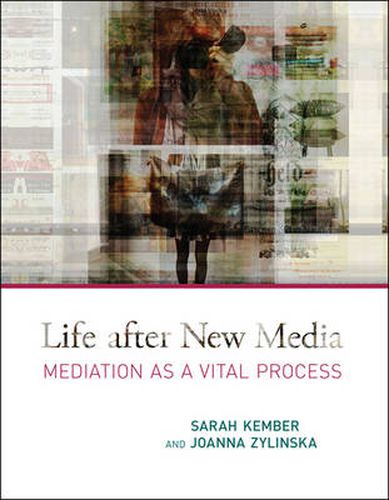Readings Newsletter
Become a Readings Member to make your shopping experience even easier.
Sign in or sign up for free!
You’re not far away from qualifying for FREE standard shipping within Australia
You’ve qualified for FREE standard shipping within Australia
The cart is loading…






An argument for a shift in understanding new media-from a fascination with devices to an examination of the complex processes of mediation.In Life after New Media, Sarah Kember and Joanna Zylinska make a case for a significant shift in our understanding of new media. They argue that we should move beyond our fascination with objects-computers, smart phones, iPods, Kindles-to an examination of the interlocking technical, social, and biological processes of mediation. Doing so, they say, reveals that life itself can be understood as mediated-subject to the same processes of reproduction, transformation, flattening, and patenting undergone by other media forms.
By Kember and Zylinska’s account, the dispersal of media and technology into our biological and social lives intensifies our entanglement with nonhuman entities. Mediation-all-encompassing and indivisible-becomes for them a key trope for understanding our being in the technological world. Drawing on the work of Bergson and Derrida while displaying a rigorous playfulness toward philosophy, Kember and Zylinska examine the multiple flows of mediation. Importantly, they also consider the ethical necessity of making a cut to any media processes in order to contain them. Considering topics that range from media-enacted cosmic events to the intelligent home, they propose a new way of doing media studies that is simultaneously critical and creative, and that performs an encounter between theory and practice.
$9.00 standard shipping within Australia
FREE standard shipping within Australia for orders over $100.00
Express & International shipping calculated at checkout
Stock availability can be subject to change without notice. We recommend calling the shop or contacting our online team to check availability of low stock items. Please see our Shopping Online page for more details.
An argument for a shift in understanding new media-from a fascination with devices to an examination of the complex processes of mediation.In Life after New Media, Sarah Kember and Joanna Zylinska make a case for a significant shift in our understanding of new media. They argue that we should move beyond our fascination with objects-computers, smart phones, iPods, Kindles-to an examination of the interlocking technical, social, and biological processes of mediation. Doing so, they say, reveals that life itself can be understood as mediated-subject to the same processes of reproduction, transformation, flattening, and patenting undergone by other media forms.
By Kember and Zylinska’s account, the dispersal of media and technology into our biological and social lives intensifies our entanglement with nonhuman entities. Mediation-all-encompassing and indivisible-becomes for them a key trope for understanding our being in the technological world. Drawing on the work of Bergson and Derrida while displaying a rigorous playfulness toward philosophy, Kember and Zylinska examine the multiple flows of mediation. Importantly, they also consider the ethical necessity of making a cut to any media processes in order to contain them. Considering topics that range from media-enacted cosmic events to the intelligent home, they propose a new way of doing media studies that is simultaneously critical and creative, and that performs an encounter between theory and practice.